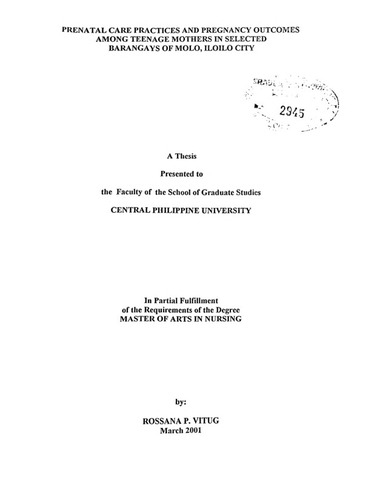Prenatal care practices and pregnancy outcomes among teenage mothers in selected Barangays of Molo, Iloilo City
| dc.contributor.author | Vitug, Rossana P. | |
| dc.coverage.spatial | Iloilo | en_US |
| dc.date.accessioned | 2021-03-24T06:57:38Z | |
| dc.date.available | 2021-03-24T06:57:38Z | |
| dc.date.issued | 2001 | |
| dc.identifier.citation | Vitug, R. P. (2001). Prenatal care practices and pregnancy outcomes among teenage mothers in selected barangays of Molo, Iloilo City (Unpublished Master's thesis). Central Philippine University, Jaro, Iloilo City. | en_US |
| dc.identifier.uri | https://hdl.handle.net/20.500.12852/666 | |
| dc.description | Abstract only | en_US |
| dc.description.abstract | This investigation primarily aimed to determine the prenatal care practices and pregnancy outcomes of teenage mothers in three barangays of Molo, Iloilo City. It was also the purpose of this study to determine whether the personal characteristics of the respondents influence the pregnancy outcomes and prenatal care practices of teenage mothers. It also aimed to establish whether there exists a relationship between prenatal care practices and pregnancy outcomes. The researcher hyphothesized that certain characteristics of teenage mothers are linked to their prenatal care practices and pregnancy outcomes. It was further hypothesized that prenatal care practices influences the pregnancy outcomes of teenage mothers. The study made use of descriptive research employing a one-shot survey design. A total of 135 teenage mothers were interviewed personally to gather pertinent data ofthe study. The data obtained were processed through SPSS = PC Windows version 6 and were subjected to statistical tests such as Frequency Percentages, Appropriate Measures of Central Tendency, Gamma and Cramer’s V. The results showed that the teenage mothers in this study were in their late teens, primiparous, single, non-working and high school educated. Data on prenatal care practices revealed that almost half of the teenage mothers had inadequate prenatal visits, a little less than half had not completed their tetanus toxoid immunization and the majority had not completed iron supplementation as prescribed by the doctor. While the majority did not manifest any abnormal pregnancy related signs, yet a considerable percentage suffered pregnancy related complications. There were few babies of these mothers who had birth-related problems. The study further revealed that there was a nil association between age on last pregnancy and prenatal care practices; between parity and prenatal care practices with the exception of parity and compliance to tetanus toxoid immunization wherein multipara mothers tended to complete their doses. The data further showed that educational attainment had a very negligible influence on prenatal care practices while married women tended to have adequate prenatal care practices as compared to those who were not married, widowed and separated mothers. With regard to the relationship between prenatal care practices and maternal outcomes, results showed that there was a marked or substantial association between prenatal visits and normal pregnancy outcome and mode of delivery during the intrapartal and postpartal periods. However, compliance to tetanus toxoid immunization and compliance to iron supplementation has a negligible association with pregnancy outcomes. With respect to the relationship between prenatal care practices and pregnancy outcomes, the findings showed that there was a negligible association between all categories of prenatal care practices and fetal outcomes. It should be noted however that of all personal characteristics, it was only civil status which was found out to be associated with fetal outcomes at the time of delivery and age of gestation. Even such association was found to be low, yet it was an important parameter or indicator which is useful in designing intervention programs. With the significant findings of the study, the researcher recommends to the DOH and other concerned health oriented groups to consider personal characteristics like parity and civil status in their intervention programs like information education, communication and motivation campaign for prenatal care and comprehensive safe motherhood program. Further studies may be conducted focusing on other variables like psychosocial aspects of pregnancy and its influence on the maternal and fetal outcomes. | en_US |
| dc.format.extent | xx, 153 leaves | en_US |
| dc.language.iso | en | en_US |
| dc.subject.ddc | GSL Theses 610.73072 V836 | en_US |
| dc.subject.lcsh | Prenatal care | en_US |
| dc.subject.lcsh | Teenage pregnancy | en_US |
| dc.subject.lcsh | Teenage mothers | en_US |
| dc.subject.lcsh | Maternal health services | en_US |
| dc.subject.mesh | Pregnancy Outcome | en_US |
| dc.title | Prenatal care practices and pregnancy outcomes among teenage mothers in selected Barangays of Molo, Iloilo City | en_US |
| dc.type | Thesis | en_US |
| dc.description.bibliographicalreferences | Includes bibliographical references | en_US |
| dc.contributor.chair | David, Fely P. | |
| dc.contributor.committeemember | Caipang, Natividad C. | |
| dc.contributor.committeemember | Alibogha, Salex E. | |
| dc.contributor.committeemember | Chin, Fely P. | |
| dc.contributor.committeemember | Alinsao, Violeta A. | |
| dc.contributor.committeemember | De Asis, Nerissa D. | |
| dc.contributor.department | School of Graduate Studies | en_US |
| dc.description.degree | Master of Arts in Nursing | en_US |


